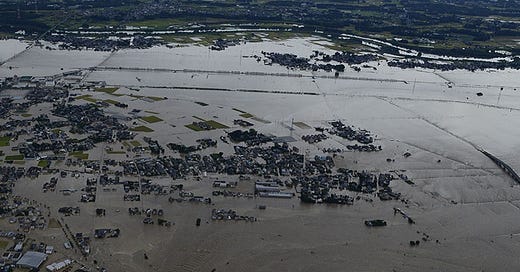Climate Change is Eating Japan
What the science says about the effects of climate change on the archipelago
The world is boiling. Japan is also boiling.
Just a few days ago, the temperature reached over 38°C in some regions of Japan. In 30 prefectures, heat stroke alerts were issued.
Hot nights (over 25°C) and extremely hot days (over 35°C) are becoming much more frequent since the 1970s.

Japanese media is busy reporting on the heat and advising people on how to cope with it. But there aren’t many reports that tie the extreme heat to climate change.
Yet climate change is clearly exacerbating the intolerable heat in Japan, and there’s good research to show this. In this post, we explore what that research says.
There will be 3 main points to draw:
Climate change is not just another environmental problem. In Japan’s own history, there have been several terrible environmental problems. Yet what makes climate change qualitatively different is that its impacts don’t respect national borders and threaten the balance of a countless number of ecological and human systems.
The second takeaway is that these effects of climate change are very much relevant for Japan. Japan is already feeling the consequences of climate change. Without every country committing to serious, fundamental reform, these consequences will get worse.
Virtually all of the solutions to climate change already exist. The only challenge is to scale the solutions that we already have. And for that, governments need to enact well-designed policies and massive capital needs to be directed at those solutions.
Let’s go.
Keep reading with a 7-day free trial
Subscribe to Power Japan to keep reading this post and get 7 days of free access to the full post archives.



